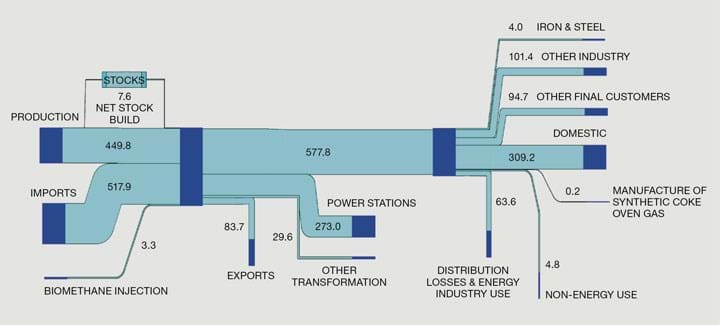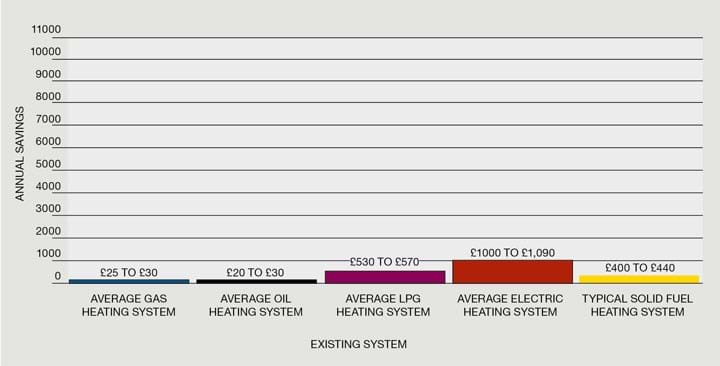Net Zero: Alternatives to Hydrogen

An alternative view for how the UK can achieve net zero for housing and other users, without the wholesale use of hydrogen.
FIRSTLY, I am not anti-hydrogen. What I am, is pro using the sustainability pillars of society, environment and economics to justify investment decisions. With respect to hydrogen, despite numerous reports to the contrary, I am not convinced hydrogen can be sustainably justified against other net zero enabling technologies.
This short article presents an alternative view for how the UK can achieve net zero without the wholesale use of hydrogen, in particular for heating and electricity generation.
As a focus, the following Sankey diagram is extracted from the UK Government’s DUKES (Digest of UK Energy Statistics) database. It clearly shows the UK natural gas users – the candidates for hydrogen replacement.

Like the European Union, I believe energy efficiency should be at the core of energy policies. So my first take on reducing CO2 and other harmful emissions is to use less energy. Treat the cause not the symptom; tackle the demand side.
From the flow chart it is evident that the domestic household is the UK’s largest direct gas consumer. Not only that, a large portion of the natural gas used for power generation is consumed to support the electrical demand from residential households. It is therefore obvious that if we can deliver on the carbon-neutral house the contribution to net zero is hugely significant.
There are no technical barriers to delivering the carbon-neutral household. Insulation, heat pumps, renewables, battery storage, thermal storage, controlled ventilation come together to deliver a zero carbon footprint. The net-zero house needs little upgrades to gas or electricity grids. As an example, Sero is one of a number of organisations providing net zero housing.
Of course the net-zero house costs money, but so does the energy for hydrogen synthesis, the hydrogen synthesis plant and hydrogen storage and distribution systems.
The Rankine cycle tells us that household heating requires four times more energy via hydrogen than a heat pump – the consequence being a power supply four times larger for hydrogen than a heat pump. Furthermore, once the household is net zero, ongoing energy bills are minimised. Indeed it is likely that the net-zero house can, at times, export energy, thus generating revenue for the household.
In addition, if hydrogen is synthesised from electrolysis it stands to reason that hydrogen per kWh will cost more than the electricity it was derived from. Moreover, methane-reformed hydrogen with CCS will cost more than natural gas. This will transform heat pump justification; presently heat pumps can be difficult to justify with the favourable natural gas price compared to electricity.
The UK’s Energy Saving Trust provides the following information for domestic fuel bill saving from deploying a ground source heat pump.

As is readily seen, there is little incentive to change to a heat pump in a house that is currently supplied with natural gas. That is a consequence of electricity being around four times more expensive that gas per kWh. Move forward to a choice between hydrogen and electricity, where hydrogen costs more than electricity, the figure will show a very different picture in favour of the heat pump.
It is interesting that Centrica has recently come out in support of the heat pump on cost grounds.
Obviously to convert existing households to net zero will be more expensive than new builds; wall insulation being a particular issue. In this respect, solid wall insulation is receiving attention and appears to be an attractive solution.
Despite my best efforts, I have yet to see the analysis that justifies hydrogen being more cost- and energy-effective than the energy efficiency/net-zero house routes. From what I can find, option analysis of net zero enablers is carried out in silos – hydrogen, heat pump, CCS etc, rather than a comparative, holistic analysis.
The next-largest UK gas consumer is electricity generation. Reducing gas consumption and CO2 footprint here is clearly a role for energy efficiency and renewables – hydro, solar, wind, tide, biofuels, etc. It should also be recognised that increased use of renewables, and adopting energy efficiency measures means the fossil industry is using less energy to produce, transport and condition oil and gas for a reduced market. A double carbon win.
I am also of the view that nuclear is a key enabler to net zero as a base load provider.
Hydrogen for electricity?
Why not use hydrogen for electricity generation? Presently, 96% of hydrogen is fossil sourced and comes from reforming processes. Reforming requires a significant amount of energy with a consequent large carbon footprint, so that makes no sense. OK, use hydrogen from a reformer and bolt on a CCS plant. That would work but why not put a CCS plant onto a conventional combined cycle gas turbine (CCGT) power plant and achieve the same outcome without the need for hydrogen distribution and hydrogen conversion at the power station?
Many commentators suggest using green hydrogen from electrolytic water cleaving for power generation. In this instance we have green electricity that we convert to hydrogen to convert the hydrogen back to electricity with all the associated energy losses at each stage – how does that make sense?
It makes sense because we can use surplus renewables, particularly wind, to make hydrogen and store it for times when renewable supply is curtailed. The surplus electricity will be free. "Aye, right" as we say in Glasgow – if the wind power producer has a market for the surplus energy it will not be given freely.
There are, though, other means for storing energy – battery technology is moving apace, thermal storage, phase-change storage, biofuels and hydro. Furthermore, if we deliver on the carbon-neutral house the need for storage is minimised.
A non-hydrogen method for energy storage is bio-energy with carbon capture and storage (BECCS). At times of increased demand, when renewable supply is short, bring BECCS power stations on line. Indeed CCGTs with CCS could also provide a useful role here.
Renewable energy import and export to/from the continent would also be a feature for negating the need for hydrogen storage.
Other industry
The next largest natural gas user is Other Industry. The largest consumers in this sector are the chemical industry, food and drinks, mechanical engineering (car manufacture etc) and mineral products.
To reduce gas usage in industry, energy efficiency has a prime role. Industrial energy efficiency will require use of energy efficient plant and equipment (electric motors, pumps, compressors, motors, furnaces etc) and heat integration. Replacement of natural gas with renewable electricity for industrial heating is also viewed as a net-zero enabler in this sector.
It is recognised that there will be some aspects of industrial activity where hydrogen can play a role. Steel is often quoted as hard to decarbonise and is a potential candidate for hydrogen. This is true, but the UK steel energy usage, unlike some other countries, is very much second order.
A key net zero area for the chemical industry is the production of hydrogen. According to the Royal Society, hydrogen production accounts for 1.8% of global CO2 emissions. Moving from the current high carbon footprint reforming process to electrolysis to generate green hydrogen as a chemical feedstock is clearly an important aspect of net zero.
Although the cost of producing hydrogen via electrolysis is reducing, it is my view that reforming with CCS will remain the more cost effective synthesis route for many years. This is pointed out by the Global CCS Institute. Low carbon, fossil-derived hydrogen is, for obvious reasons, a favoured option for the oil and gas industry.
Other final customers
The final large natural gas user is Other Final Customers. This sector involves mainly heat for public administration buildings and commercial office blocks. The discussion around the net zero for households equally applies here too.
The hydrogen argument also falls down in many aspects of transport. For the passenger vehicle the hydrogen fuel cell electric vehicle (FCEV) can’t be justified against a battery electric vehicle (BEV) from an energy and cost standpoint. I point this out in a recent TCE article. Range and fill speed are seen as the main benefits for hydrogen. Battery technology is advancing on both counts, and battery swap, as done in China, is also a solution for range and fill speed. Penn State University is one of a number of organisations investigating reduced charge times – they have a concept for a 10-minute charge.
Hydrogen appears to have a role for long-distance heavy haulage, trains and shipping. Though for trains, Hitachi may think otherwise; it has recently signed up to produce 400 battery trains for the UK.
Bio-fuels should not be overlooked. Bio-fuels look like a competing option for heavy haulage, trains, shipping and aircraft. Unlike hydrogen, liquid bio-fuels need little or no engine modifications.
The EU recently produced its report, Powering a climate-neutral economy: An EU Strategy for Energy System Integration. To my mind it presents an energy plan that the UK could do well to adopt.
The three key elements of the strategy are:
- A more "circular" energy system, with energy efficiency at its core.
- A greater direct electrification of end-use sectors (heat pumps for space heating or low-temperature industrial processes, electric vehicles for transport, or electric furnaces in certain industries).
- Use of renewable and low-carbon fuels, including hydrogen, for end-use applications where direct heating or electrification are not feasible.
Hydrogen is certainly not at the core.
In the same week that the EU report was published, a UK All Parties Parliamentary Group produced How the UK’s hydrogen sector can help support the UK’s economic recovery. I found the report lacked balance and was biased towards use of hydrogen for domestic heating. Perhaps the report sponsors had something to do with that? (BAXI, BOSCH, Cadent, Equinor, EUA, National Grid, Northern Gas Networks, SGN, and Shell.)
No silver bullet
A few years ago I was a keen proponent of hydrogen. What’s not to like – it combusts to water (and NOx). As time has passed, my enthusiasm has significantly waned as I’ve embraced IChemE’s systems thinking approach and considered the benefits of the other net zero options.
To bookend this article, I started with I am not anti-hydrogen. I am not. Hydrogen has a role to play in net zero, but is not the silver bullet as promoted by many. In the most important net zero areas in the UK – heating, power supply, passenger car – hydrogen, to my mind, is not the preferred solution. The main use for low-carbon hydrogen is as a feedstock for the numerous chemical processes that use hydrogen as a building block. Heavy haulage, trains and shipping seem like another fitting application together with systems where electrification is difficult.
I’m with the Chief Executive of Scottish Power, Keith Anderson: “Electrify the hell out of everything right now,” in an effort to achieve a green recovery from the coronavirus pandemic.
Recent Editions
Catch up on the latest news, views and jobs from The Chemical Engineer. Below are the four latest issues. View a wider selection of the archive from within the Magazine section of this site.




